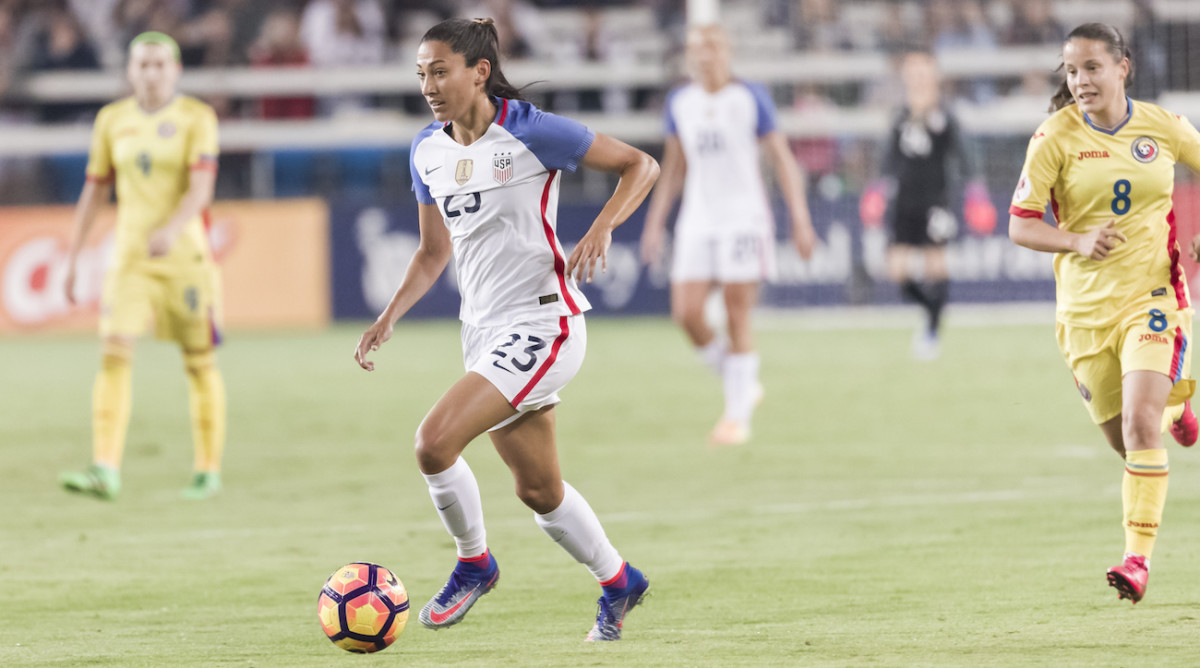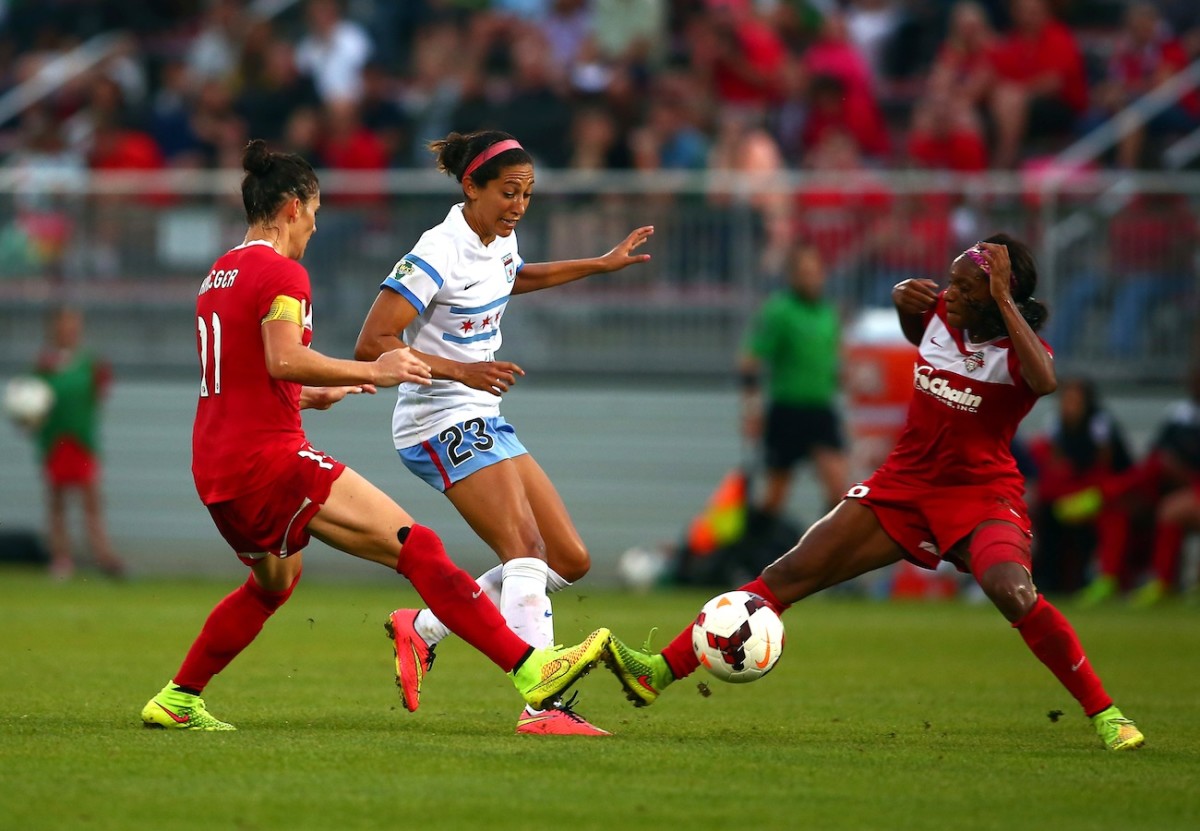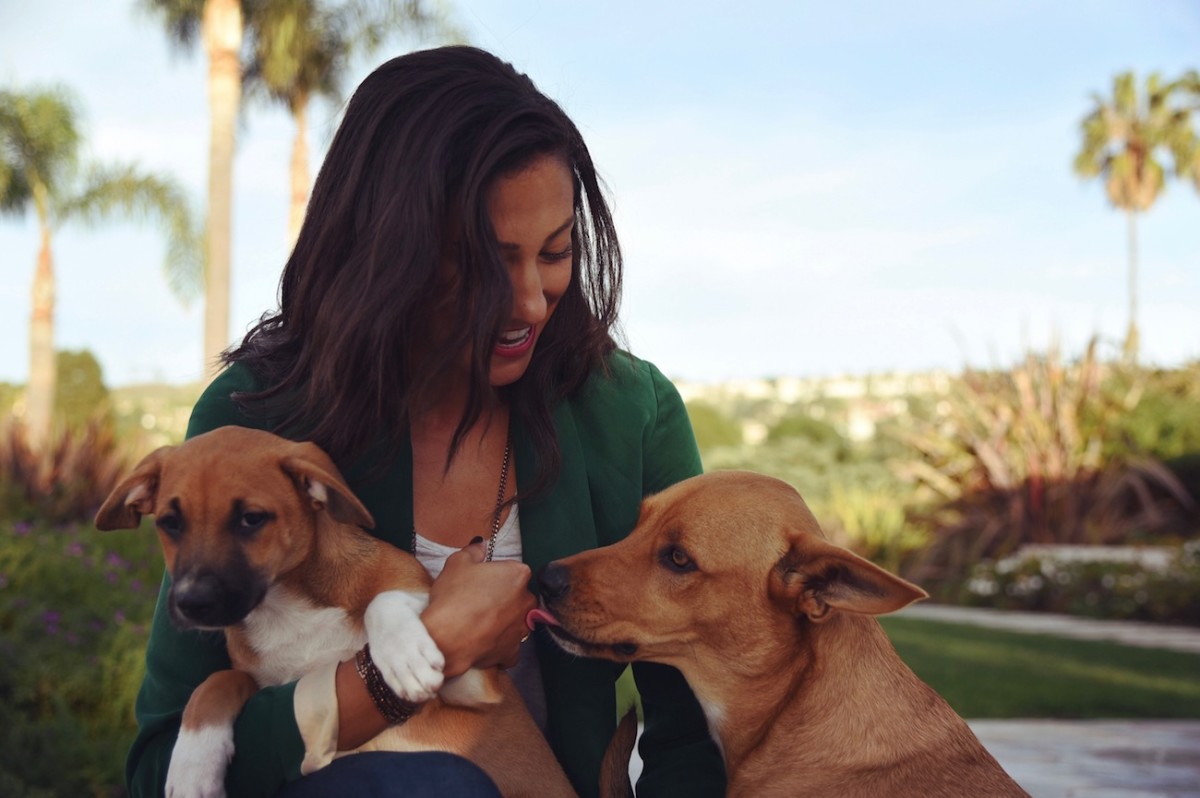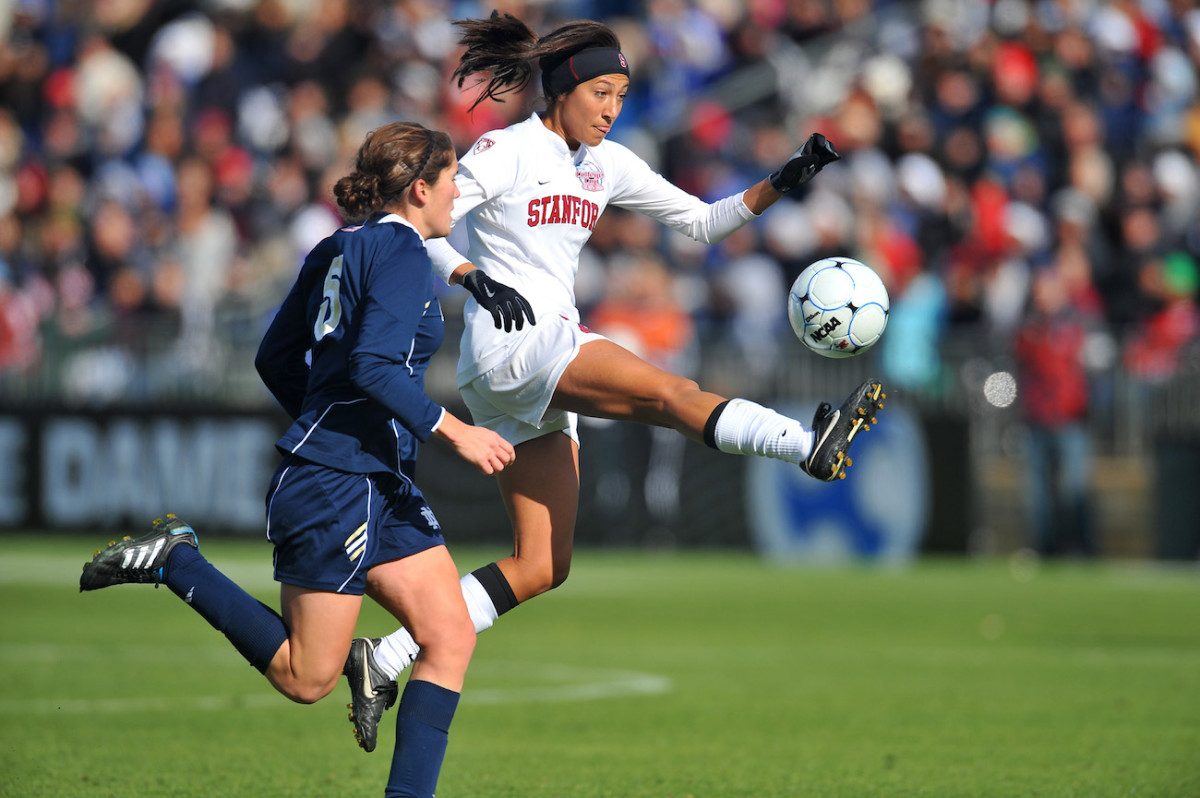Catching Up With Soccer Player Christen Press


Many young soccer players all over the country want to be just like Christen Press. Always smiling on the field and scoring beautiful goals, she’s a professional who makes the game seem effortless most of the time. However, Press has worked hard to get where she is, and her path hasn’t always been easy.
A standout in college at Stanford, Press won the 2010 MAC Hermann Trophy honoring the best player in college soccer. Still, her college days were filled with stress and anxiety about always wanting to be better on the field. Though she hoped to get picked up by the U.S. Women’s National Team, it wasn’t until Press played in Sweden and in the National Women’s Soccer League that her dream of playing for her country came true: She was picked for the USWNT in 2012. One of the youngest members of the USWNT team that won the 2015 World Cup, Press recalls the ticker-tape parade in New York City as being the best part of that whole experience.
On the other hand, the team’s loss in the knockout round of the 2016 Olympics was a career low for Press, who dealt with the setback by getting out in nature, hanging out with her dogs and family, and reflecting on what makes her happy. Press is currently living in Chicago and loving it, preparing for her fourth season with the NWSL’s Red Stars.
What is it like playing on the U.S. Women’s National Team? Is there a lot of pressure?
I think playing for the national team is a lot of fun. It is hard at times, because we travel a lot. And there is a lot of pressure to be successful, and not to let your teammates down, not to let yourself down—and also all of the people who watch us and support us. We play for them, so we never want to disappoint them. I do a lot of different things to deal with the stress that comes with that, and a lot of it is just in my routines in everyday life—doing yoga, meditating, remembering that at the end of the day my happiness is really important, and I have to be careful with it. I have to cultivate it, so that no matter how much stress or pressure that I’m under I go to bed every night with a smile on my face.
What is it like playing for the Chicago Red Stars, and how is that different from playing on the national team?
This is my fourth year on the Red Stars. I think that my favorite thing playing for this club is that every year the team gets better and the organization gets better. It’s cool to be a part of something that’s growing and improving. It’s different than playing for the national team in that I get to stay in one place, which is Chicago, and you know you have the same fans come out on the weekends. I’m really lucky, because Chicago is a great city. It’s beautiful, and I’m here in the summer, and it’s a lot of fun!
So would you say playing for the Red Stars is a little less stressful than playing on the national team?
I do think so.
When did you know you could take soccer to a high level? Was there a time in your childhood when it all just clicked and you knew you had something special in this sport?
I think that when I was in college—that’s when I really started to think that I had a chance to play professionally and to play for the national team. Before college, I didn’t think I could do it or would do it, and I didn’t ever really know what that meant. When you see the national team play when you’re little or young, you don’t really know that it’s a job, that it’s a career—that after college you can be a soccer player. Especially for me, because women’s soccer wasn’t as big back then. But when I got to college and saw some of my teammates, like Kelley O’Hara, go off to play for the national team and play professionally, then I started to think, Hey, maybe I could do that, too!

Have you always liked to play up front, or did you ever like to play other positions?
I’ve pretty much always been a forward, and I love it! I think it’s the best position, personally. Sometimes now in Chicago I get to play center-mid, and actually it’s really fun! I really like playing there, because I get the ball more and I get to be more involved, and I learn more. That’s fun, because it’s a new challenge. But at the end of the day, I feel most confident at forward, and I definitely feel like I’m a specialized player who is meant to be a forward.
So that’s where you’re most comfortable?
Yes, and as a center-forward—I’m most comfortable in the center.
Winning the World Cup must have been a huge high for you. Can you talk a little bit about that experience and what the best moment of it all was for you?
It was a crazy experience. It was one of those experiences that you can barely remember. It kind of feels like a dream now. One of the coolest things we did after the tournament was the ticker-tape parade in New York City. It was fun to see how many people had supported us, because when we were in Canada there were obviously a ton of American fans there, but you’re kind of isolated from America because you’re in a different country. So when we came back and saw all of the people and saw how happy they were in the streets, in their red, white, and blue, celebrating and throwing confetti—it was fun to share such joy with so many people. It was an experience I’ve never had before, and I don’t know if I’ll ever have it again.
Was it difficult being one of the youngest players on the roster for the World Cup, and did you have any mentors on the team who helped you?
A lot of players definitely helped me out a lot when I was new on the team and all the way through the World Cup. Lauren Holliday was probably the player who took me along the most, and she always made sure that I had things to do when we had free time, and that I was never alone, and that I always knew what was going on—on the field and off the field.
Do you miss having Holliday on the team?
I miss her a lot!
On the other end of the spectrum, the Olympics had to have been one of the most disappointing experiences you’ve had as a player. How did you manage that disappointment, and how have you come back to embrace playing again? Did anything in particular help you through those tough times?
That was so hard. My dad and my sister and my best friend had flown out for the tournament, and everyone had to push their flights to come home early, and it was definitely not what we had expected or hoped for or trained for, so it was really difficult…What I did when I came back was I just kind of took a whole week to myself to…get a little bit of perspective and remember what’s important. Obviously it’s an honor to play for my country and to represent my country, but at the same time, life’s so much bigger than just my job or just what I’m doing. I think the simplest reminder I got was from my dogs. When I got back, they didn’t care what happened! And I think that’s true with all nature—being outside. I took a lot of walks; I went to the beach. I think it kind of reminds you that you’re just one little speck on the earth, and, while it seems so devastating, you will play again, and you will have another chance.

When you think back to your college soccer days, what are some things that stand out to you most? Anything you can tell other young players who might either be playing now or wanting to play in college that you wish someone had told you?
College soccer for me was very stressful. I think that was when I had the most stress on me as a player. I remember playing at Stanford, which is an opportunity to play with all your friends and in front of all your friends. It was beautiful and sunny and it was a great time, but at the same time I was really focused on trying to be a professional and trying to make the national team, and for a lot of those days I was more stressed than I was happy. So I think for younger players who are in high school and college and they’re trying to make the next level, I think the best advice I could give is that when you’re happy, you’re playing better. When you’re confident and you’re focused, you play better. So sometimes thinking about the result detracts from the process, and the process is what gives you the result.
That’s really smart! Do you remember anyone else going through that same thing when you were stressed, so you could connect and talk about the stress?
Yeah, I think a lot of my teammates in college were going through the same thing. It’s a hard time because you have a lot of school work, you have a lot of soccer, and it’s the first time that you’ve ever taken care of yourself. It’s the first time that you have your own apartment, you’re away from your family, so it’s pretty emotional for a lot of people. I think people love it and have a lot of fun, but it’s a lot to learn in a few years. I think a lot of my college teammates and my friends were going through the same thing.

Well, right now I would say my biggest role model who is still playing is Serena [Williams]. I love to watch her play. I think she is a phenomenal woman. I love watching tennis, especially because it’s such a physical sport, and you get to see the athlete working and sweating under the sun for hours. There’s such a high demand, and there’s so much emotion to it. I love watching it, and that’s what I love about Serena. She plays with her passion. She’s so good, and she’s been so good for so long. I can’t imagine how hard it is to stay on top. She’s definitely someone I look at and wonder about and get inspired by.
Do you know Serena Williams personally, or have you ever met her?
I have never met her. Have you ever interviewed her?
No, but I should! I should tell her about you!
She could be next on your list!
So is there anyone else specifically in the soccer world who inspires you?
Yes. When I was young, I looked at all of the 1990ers as inspirations. I think that was the first time I ever really saw women’s soccer be so popular. Seeing not only just the game being so much fun, but how many other people loved it, was really cool.
This is a rebuilding time for the USWNT. What are your personal hopes for the team, and for yourself specifically, in this growth period?
It’s definitely a growing period for us, and that’s where I am personally, as well. I’ve had a lot of different roles on the team, and I think now I’m in more of a leadership role, being one of the more veteran players, which is scary to say, because I didn’t realize when I got old! My goals are to be on the World Cup team, to be a leader on the team, to be a better player than I am each day, to always improve, to reach my personal goals, and to not let everyone else’s expectations and everyone else’s goals for me really dictate my life. [I want to] get to be the person that I want to be and that I’m supposed to be.
Photographs by (from top): Tony Quinn/Icon SMI/Corbis/Getty Images; David Madison/Getty Images; Courtesy of Christen Press; Jeffrey Camarati/NCAA Photos/Getty Images
